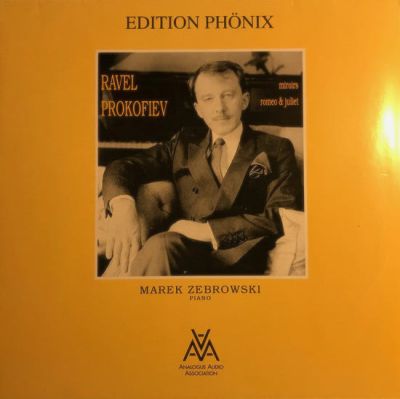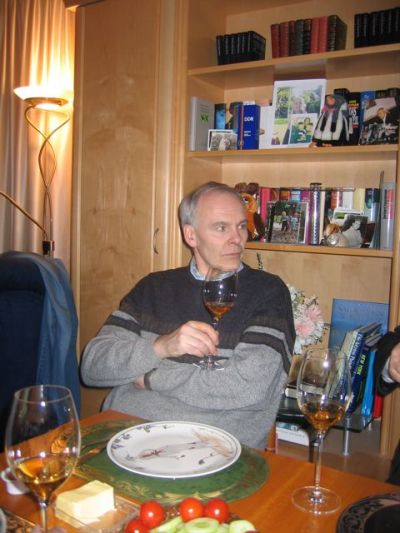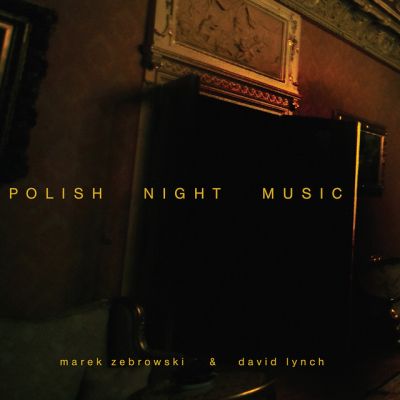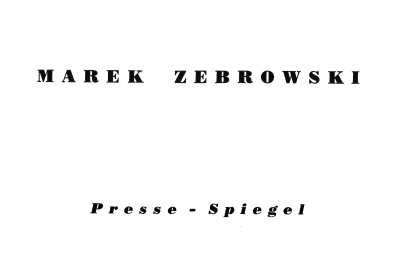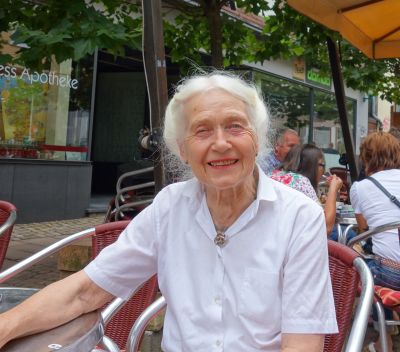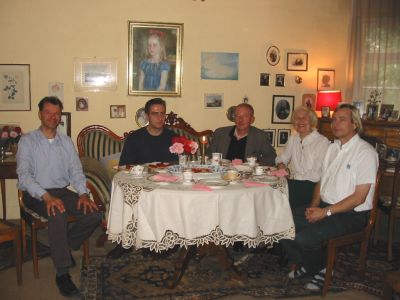Marek Żebrowski: My German adventure

My adventures in Germany actually began in Boston, Massachusetts, at some point in the early 1980s. A recent graduate of the New England Conservatory, after completing my studies I continued to reside on the East Coast. Besides performing in the area, I was teaching at M.I.T. and University of Massachusetts.
One chilly Boston night, I went to hear a concert by my friend, Krystian Zimerman and, after talking to him briefly backstage, a young and smiling fellow Pole came up and introduced himself to me. His name was Waldemar Radacz. He heard me chatting with Krystian and mentioned that he lived in Germany, was a pastor in Kassel, and occasionally organized concerts there. I think that at that point I suggested we meet before he left Boston and Waldemar readily agreed to this idea. He also mentioned that he brought some artwork by one of his German friends, Bernd Mlodoch, and I eventually bought a few of Bernd’s small hand-colored prints from Waldemar.
As time went on, it turned out that this chance encounter led to meetings with all kinds of fascinating individuals in Germany, who eventually became close friends of mine. After some correspondence – via air mail as email wasn’t yet in use – one hot June a year or two later I ended up in Germany, where Waldemar arranged a few solo recitals for me. He lived in Kassel, and almost instantly I was introduced to Frau Korte, Waldemar’s neighbor in the apartment building. She turned out to be a very helpful middle-aged lady who loved to bring fresh strawberries and other sweet treats to her neighbor and his new Polish friend.
My recitals in Kassel and especially in Marburg were very well attended and press reviews were quite favorable. Also after my Marburg concert, I finally had the opportunity to meet Bernd Mlodoch and let him know that his artwork was already hanging on the walls of my Boston apartment. Visibly delighted with this news, Bernd invited me to his studio on Marburg’s tree-lined Uferstrasse, where I had a chance to admire his extensive portfolio of artwork and his printing press that fully occupied one of the four crowded rooms of his apartment.
Another longtime friend I made after my Marburg concert was Joachim Kramer, a well-known piano teacher in the area, who invited me to visit him in Sindersfeld, a tiny and picturesque village about 20 km from Marburg. Joachim lived in a large house at the edge of the village and from each of his windows and his outdoor terrace a magnificent view of rolling countryside with wooded hills and fields of mustard green extended as far as the eye could see.
Joachim eventually offered to not only help with arranging some concerts for me but also very generously offered lodging in his house, free of charge, whenever I needed it. Since he had a concert grand piano in his living room and told me I could use it anytime he was away to teach his students, I couldn’t refuse his extraordinary hospitality. In return, I often cooked supper to greet Joachim at the end of the day when he returned from teaching; we’d sit in his dining room (or on the terrace) and watch long summer sunsets punctuated only by the singing of birds. Before nightfall, we’d also take long walks in the surrounding fields with Joachim’s little dog, Susie, a dachshund mix, who loved these excursions and always recognized the word “Spazieren” by madly spinning with joy and bolting out like a bullet as soon as the house door was opened. Still another friend I made at that time was Susanne, Waldemar’s sweet and caring partner, who through her connections arranged for my recitals at the hilltop castle in the nearby resort town of Bad Wildungen.
From that time onwards, a recurring pattern on my calendar of summertime tours of Germany took shape. As soon as my academic obligations in Boston ended in early June, I would pack my bags, bring my scores and concert clothing, and fly out to spend several weeks in Europe. Upon arriving in Frankfurt I would rent a car and drive to Marburg – first over the autobahn and then over smaller local roads leading to Sindersfeld that became my base of operations for the duration of each of my tours.
Through Waldemar’s music connections in Trier, I was invited to perform there as well as in Saarbrücken and in nearby town of Lebach. In Saarbrücken I met another music enthusiast and a devoted fan of pianists and piano music, Raphael Kreutzer, who also volunteered to help with my engagements in Saarland and later assisted Joachim with some of my concert organization. In that area of Germany I also gave several chamber music concerts with a cellist from Kassel, Claudia Schwarze and Carola Nasdala, a violinist from the former East Germany. We called ourselves the “Ost-West Trio” and performed at the Schloss Saarbrücken, Trier, and in various other concert venues throughout the State of Hesse.
Since Joachim was a respected teacher in and around Marburg, my circle of German friends in the fields of music and art kept steadily expanding. Wolfgang Jungraithmayr, a talented violinist and pianist who eventually settled on a career in the medical field as a thoracic surgeon, was one of them. I remember reading through Beethoven’s Sonatas for violin and piano with Wolfgang, as well as visiting his parents’ house on a quiet and leafy street in Marburg. Many years later, when Wolfgang was a resident surgeon in one of the leading hospitals in southern Germany, I visited him and even had a chance to observe him in the operating theatre. He also came to visit me in Boston and on that occasion we spent one Thanksgiving holiday with my family friends in Portland, Maine.
Except for one concert I gave at Munich’s Gasteig, my trips to this elegant capital of Bavaria were usually purely private and personal – whenever I was in southern Germany, I stopped for a few days in Munich to see my old friend from Harvard, Stanisław Kadziewicz, who worked for Radio Free Europe there.
As I kept driving all across Germany to rehearsals and concerts, I would always budget whatever time I could in Sindersfeld, spend a few days with Joachim, get some rest, and put in many hours of piano practice on his imposing Grotrian Steinweg grand. My reward would invariably by an evening chat with Joachim and a long walk with his dog, Susie, after supper. One summer, after my American cousin, Marie, unexpectedly lost her husband to a heart attack, Joachim graciously invited Marie and her two daughters to spend a few weeks in his Sindersfeld house and do some sightseeing with me in-between concerts. It was a beautiful experience for two of Marie’s very young daughters and, after a week or two with Joachim I was happy to drive them all the way to Calais, where they boarded a ferry to England before returning to their New Jersey home.
On another concert tour, after a rehearsal at the Marburg Stadthalle and following a well-worn pattern, I dropped by for a quick visit with my artist friend, Bernd. After a cup of tea and a chat, I left his apartment to walk over to my car parked across from his apartment on the Uferstrasse. As I did so, I noticed a middle-aged lady, her blonde hair neatly braided, dressed in a traditional Hessian green skirt and a white wool richly embroidered jacket, struggling along the riverbank sidewalk with two very full shopping bags. I walked up to her and offered a ride which, after a few perfunctory protests, she readily accepted. After I dropped her off and helped her with the shopping bags to her apartment door, she inquired about my name. After I introduced myself she immediately said that she saw my name somewhere. To which I answered, “Probably on the posters all over town announcing my recital.” She then introduced herself, “I’m Frau Adelheid von Geyr” and added, “I love music and would love to hear your Stadthalle recital. I’ll bring some of my relatives and friends as well.”
A few days later, as I was receiving random fans after the concert, at the end of the line I saw smiling Frau von Geyr and several other people of various ages that accompanied her backstage. The most senior was her diminutive mother-in-law, who introduced herself as Ursula Geyr von Scheppenburg, Freiin von Rheinbaben. As we began to chat, she quickly mentioned that many, many years earlier, she befriended Col. Michał Żebrowski, who lived on a nearby estate in what is now north-central Poland. They occasionally met for a game of bridge, sometimes at her house and sometimes at his. “Is he a relation of yours?” she quickly inquired. Indeed, Michał Żebrowski was my grandfather’s younger brother, whom I never met because he died in 1949 after returning from a POW camp in Germany!
Afterwards, Frau von Geyr often invited me to Sunday afternoon tea at her Marburg apartment, tastefully furnished with Biedermeier furniture, old paintings and drawings, and many other lovely objects d’art. Her circle of titled family and friends gathered on such occasions to take turns reading romantic German and French poetry aloud, then sip tea and enjoy various cakes laid out on a starched linen tablecloth. Summer afternoon breezes animated the muslin curtains of half-opened windows, and the sunlit garden shaded by the old cherry tree provided a perfect backdrop for the mesmerizing verses that gently drifted through Frau von Geyr’s salon. Throughout these magical Sunday meetings her guests sat still, daydreaming as the gently rolling rhythms of the finest and most evocative poetry instantly transported everyone to the bygone era.
Touring Germany throughout the late 1980s and the early 1990s gave me a chance to try out different piano repertoire I’ve acquired over the years of my studies in Poland, France and America. At some point I decided to return to Ravel’s Miroirs, a set of five piano pieces I played for my Bachelors of Music recital at the New England Conservatory some fifteen years earlier. Since German public (and local press) received my performances of Miroirs warmly, I decided to record this rarely performed set and pair it with selections from Prokofiev’s Romeo and Juliet suite. Once this decision was made, Joachim quickly managed to find the Festeburgkirche near Frankfurt, an excellent modern venue with wonderful acoustics and a great Steinway concert grand. He made the necessary arrangements and also found a superb and experienced recording engineer, Wilfried Zahn. The sound on this CD issued by Apollo Records in Germany in 1992 was so outstanding that the Analogue Audio Association soon asked for a license to publish it in a high-quality vinyl LP version that came out in Germany only a year later.
My next recording project – also supervised by Joachim Kramer and recorded by Wilfried Zahn – turned out to be quite an adventure. This time Joachim found a fine late 19th century church in Leipzig (Paul-Gerhardt-Kirche), with a barrel-vault ceiling and great acoustics but without a piano! After many inquiries and very complicated negotiations, a superb Steinway concert grand was eventually rented for my recording project from the fabled Kreuzchor in Dresden. It was August 1994 and just a few years after Leipzig and Dresden – along with the rest of the former East Germany – were finally reunited with the rest of the country. Driving east with Joachim from Sindersfeld was both exhilarating and challenging. Once we crossed the former East German border, the roads quickly became decrepit, the signage was spotty and misleading, and infrastructure everywhere showed a lot of longtime neglect. Staying in a nice guesthouse just outside of Leipzig we were spared the random noise of many building sites all around downtown, where many seemingly abandoned houses were being either torn down or undergoing complete renovation. One could see the city with proud musical traditions slowly regaining its former glory, and realize how much still had to be done. In any case, this CD recorded in Leipzig’s Paul-Gerhardt-Kirche with Wilfried Zahn once again at the master controls, featured Robert Schumann’s Symphonic Etudes, Op. 13 and Waldszenen, Op. 82. This time, however, owing to various complications and a change of management at the Apollo Records label, my recording languished unpublished for exactly 30 years until Polish Chamber Musicians’ Association (Stowarzyszenie Polskich Muzyków Kameralnych) and its energetic and resourceful director, Grzegorz Mania, decided to revive this project in 2024 and issue it on their own label.
Whilst my concert tours of Germany effectively ended in the mid-1990s owing to my moving to Los Angeles and assuming different professional responsibilities, my close connections to Germany not only remained, but also moved to another level and a completely different subject area that had nothing to do with music!
Just about that time, I began making connections in the world of film and through one of my friends, the iconic Polish film director, Jerzy Skolimowski, I met Marek Żydowicz, director of the CAMERIMAGE Film Festival in Poland. First held in Toruń in the early 1990s, CAMERIMAGE eventually moved to Łódź in 2000. After some late-night persuading in Los Angeles, Marek convinced me that I could help him – and the Festival – by being a link to the Hollywood film community. He invited me to the first edition of CAMERIMAGE in Łódź and the rest (as it is often said) is history. Quickly I began to help organize the Festival by overseeing its competition juries and editing a series of commemorative albums honoring each year the recipient of the Festival’s Lifetime Achievement Award. These two tasks – overseeing the juries and writing a new album published every year in November at the Festival – basically describe my duties and involvement in this during the past 25 years.
This is also how, in short succession, I met two great German cinematographers, Karl Prümm and Wolfgang Treu who served for many years on various CAMERIMAGE juries and gradually became close and valued friends. Volker Schlöndorff, the iconic German director and one of the early supporters of CAMERIMAGE, also became a dear friend and I had the honor of writing a book about him in 2009 when he was presented with one of the CAMERIMAGE Festival’s awards. A year later I befriended and wrote a book about Michael Ballhaus, another legendary German cinematographer, who received the CAMERIMAGE Lifetime Achievement Award in 2010. In 2021, my book subject was the cinematographer Jost Vacano, another German friend of two decades, whose camera work (including the iconic Das Boot with Wolfgang Petersen) was recognized with the Lifetime Achievement Award at CAMERIMAGE.
In addition to meeting these pillars of German contemporary cinema, I had the great pleasure to meet the leading lights of German film industry representing such companies as ARRI, Zeiss, and Hawk, among many others. They were invariably charmed by the fact that we could converse with them in German (a legacy of my childhood tutor), and that my connection to film was only tangential, since most of my professional activities continued to be centered on music.
It was the music connection that intrigued Prof. Dr. Karl Prümm and led to him inviting me to participate in the Kamerapreis Festival in Marburg in 2007 as a guest pianist performing a recital that also included some of the best-known music from Hollywood films. Held at the historic Marburg University Aula – a hallowed hall noted for being a venue for its most famous debate between Luther and Zwingli – my performance attracted not only the regular filmgoers but also almost all of my friends in the area: Joachim Kramer, Wolfgang Jungraithmayr and his family, Bernd Mlodoch, Frau von Geyr with her relatives and friends, and many others. I shall always relish the astonished faces of Marburg’s city officials and other filmmakers whom I introduced to this eclectic circle of my artistic, aristocratic and musical friends from Marburg. It was the moment when my German connections came full circle and the worlds of music and film suddenly found a common denominator in my presence among them. Dr. Prümm was delighted with the outcome as much as I was, and my friends as surprised as many others who saw me either as a musician or a member of the Hollywood establishment.
In any case, even if during the past few years my visits in Germany were quite rare, I continue to keep in touch with those friends who are still around after all these years. Without a doubt, I shall always look forward to returning and reconnecting with my German friends, and to spending time with them, reminiscing about our joint adventures and discoveries throughout all these years.
Marek Żebrowski, October 2024

